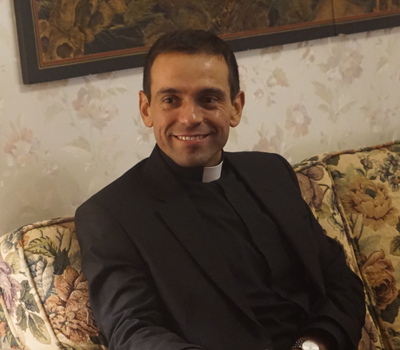– Jasmin Yiu
Rev. Prof. Cristian Ovando Mendoza, Professor of the School of Church Communications at the Pontifical University of the Holy Cross in Rome, visited Macau and Hong Kong to promote the importance of Church Communication as well as a fundraising project which benefits priests from all over the world who study at University of the Holy Cross.
Prof. Mendoza also visited the office of Kung Kao Po (KKP) and Sunday Examiner (SE), the weekly newspapers of the Diocese of Hong Kong.
During the meeting with O Clarim, KKP and SE, Prof. Mendoza briefly introduced the Department of Communication, which was created in 1996. He said, “The School of Church Communication at Holy Cross has a principle aim, that is to train the future communication directors of the diocese, which include media, relations, spokesmen of the bishop, and so on. Over 80% of our students are priests, and 20% are laymen. Students will learn all the theories of communication, and some [are] very practical fields. I teach Financial Communication of the diocese, which is to teach students how to explain what the Church has, and what the Church doesn’t have.”
After meeting the Catholic media of Macau and Hong Kong, Prof. Mendoza met with local priests in Hong Kong, introducing the structure and techniques of communication within the Church, as well as making use of technology in spreading faith to young people. A priest remarked to Prof. Mendoza that some people are starting to withdraw themselves from technology (such as smartphones and new media), and Prof. Mendoza stressed that the Church has to teach people to truly make use of them because these technologies are very addictive. “The technology itself is very useful, but also very dangerous in a sense,” he added.
Talking to O Clarim, Prof. Mendoza shared a few ideas on the role and mission of Church Media.
How did you start the work in Church Communication?
I did finance in Mexico for five years, and then on theology. My doctorate degree is in theology. The idea of communication came up just because I liked it, and the most interesting thing is the fundraising, because it is just learning to deliver your mission in a way that is understandable. This is very important and evangelical at the same time.
What makes you come to Asia?
Since 2006, I have been working in the Promotion Department of the Pontifical University of the Holy Cross in Rome where 25 percent of our students come from Asia and Africa. We want to increase the number of students coming from this part of the world, where half of the human population lives. Currently we have 1600 students enrolled from 75 different countries; most of them, around 80 per cent, are diocesan priests sent by their bishops to Rome in order to prepare themselves to become professors in the local seminaries. Asia is a key place for the future of the Catholic Church.
After meeting the journalists and editors from the Church media in Macau and Hong Kong, what do you think about the media work in these two places?
There is a big desire to transmit the beauty of the Christian Faith in an attractive way. Therefore the key challenges for the Catholic Church in Macau and Hong Kong seems to be in translating the peace and joy that the Gospel brings to our lives in a clear way for our brothers of other religious denominations, or even for those who call themselves non believers or secular people. I learn that there is great creativity and desire to spread even more the news of the Catholic Church to more people.
From your point of view, what is the mission of Church media? Is there a specific role for Church media within the Church?
The corporate media of the Catholic Church has the delicate mission of unifying the public image of the Church with its reality. We live in a world where more people want to tell others about their lives and where we want to know more about others’ lives. This creates a circle where people in general and faithful in particular aim to know more. This was expressed by Prof. Michael Schudson from Columbia University as the rise of the right to know. The institutional media therefore has the privilege of working with our pastors, helping them to transmit in an always-more-accurate-way the meaning of being disciples of Jesus Christ in the middle of the world.
I understood that you have given a talk to priests on communication in the Church. What is the role of a priest in today’s Church, in the aspect of communication?
The priests in the Catholic Church are called to multiply their efforts for serving always better than the faithful. And due to the lack of priests we should focus more and more on the administration of sacraments. Nevertheless, this shortage of priests leads us to increase the public presence of the Church with the help of new technologies. Learning how to collaborate with young people and experts in media communication would foster the service that priests can give to the faithful, with their preaching, teaching and praying through the digital platforms. The priest does not necessarily need to be a media expert, but he needs a media diet, knowing where to look for essential information and where to provide it in the digital square.


 Follow
Follow


